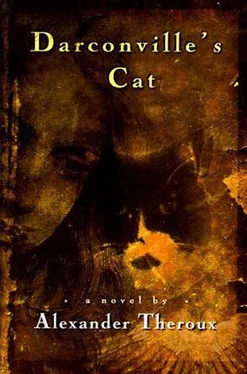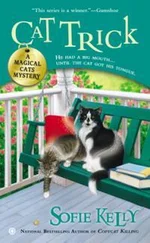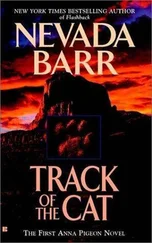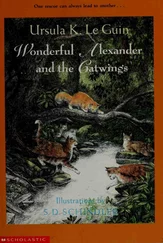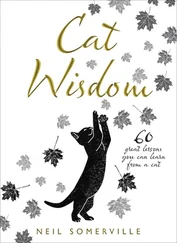It had grown dark.
Darconville had finished a day’s writing, took some cigarettes from his suitcase, still as yet unpacked, and walked through the disheveled light down the flight of stairs to the porch — the night was positively beautiful — when past the hedges, through the rustling leaves by the large tree, he thought he saw a girl, looking apprehensively side to side, walk quickly across the street like a tapered dream-bird in fragile but pronounced strides and then disappear. But he noticed something else. He reached down to pick up from the doorstep a small round object, studded with a hundred cloves, its pure odor a sweet orange like September. It was a pomander ball. Darconville, by matchlight, slipped the accompanying card out of its tiny envelope. It read simply: “For the fairest.”
They were the three words that had started the Trojan War.
Death hath not only particular stars in Heaven, but malevolent Places on Earth, which single out our Infirmities and strike at our weaker Parts.
— Sir THOMAS BROWNE, A Letter to a Friend
RULE A LINE from Charlottesville, directly through Scottsville and its lazy river, and draw it down — a straight 180°—into the southside, fixing it to a terminal in the heart of Prince Edward County, Va. Follow scale to measure the low point. Now, drive that sixty miles of narrow godforsaken road past old huts and shacks, scrub pines and blasted forests into a desolation the crossed boundaries of which, though not silent to your eyes, one feels more in the depth of imagination, the kind of anxiety, a foreboding, of a guilt within not traceable to a fact without; turn then and trail slowly on a wind across a tableland of sallow weeds and sunken dingles into flat tobacco country where the absence of perspective seems as if offered in awful proof of what suddenly, crouching in a perfect and primitive isolation, becomes a town. Stop your car. Your hesitations are real. You can hear yourself breathing. You can hear your hands move. You are in Quinsyburg.
It is immediately a terrible letdown, a dislocation, solitary in the framework of its rigid and iconoclastic literalness, which yet sits in the exact center of the Commonwealth of Virginia, a state commemoratively named — if we may charitably disregard for a moment her biological interMdes with everyone from the royal dancing master to the beetle-faced Duke of Anjou[1] — after the twenty-third British sovereign, Elizabeth I, she of the judas wig: bastard, usurper, excommunicate, baldpate, heretic, murderess, schismatic, and willing copulatrix. The sharp and instinctive disappointment you feel, that this must be the capital city of all failure, wrongheadedness, and provinciality, does not subside — it increases, intensifies, heightens. The approach that announces with sadder and sadder emphasis its sterility leads only to a confirmation of its deeper afflictions: for it amounts to, infringes on, nothing, shares npthing with the prospect of the sky but, deathshot with monotony, lies like a shroud wrapped around itself as if, so determined, it refuses to be inhabited by even so much as the relative humanity of a corpse. It is infinitely liker hell than earth, the proper place to feel the first hint of the decay of the fall. It appears to have extracted from beauty the piety given to it and, keeping that, dismissed the rest as ignominious accident to build a town. A sign tells you where.
[[1] Greetings here might also be extended to Alençon; Charles Blount; Hatton; De Vere; Heneage; Sir Walter Raleigh; Admiral Thomas Seymour; Robert Dudley, Earl of Leicester; Eric, King of Sweden; Robert Devereux, Earl of Essex; Archduke Charles of Austria; and any number of others.]
The place — nothing surrounded by nowhere — is rigorously confined within its own settled limits, huddled, as if on its knees searching the corners of its rural conscience for some sin of omission or commission whereby, to ratify the truth of natural depravity, every pleasure, every recreation, every trifle scratched out of the dust might then be magnified into a great offense, and less for its severe white churches than a general mood of dissent do you feel that the deepest solicitudes of its inhabitants must have nothing to feed on except by what either outraged godliness or gave the devil his due. Crete had no owls, Thebes no swallows, Ithaca no hares, Pontus no asses, Scythia no swine. Quinsyburg had no hope. It is overpowering to realize and worse suddenly to accept, you fight it, and only the muteness of apprehension stifles an immediate impulse to cry out in despair, “Of all the loveless, lifeless things that quail beneath the wrath of God, commend Quinsyburg to it!”
IV He Enters the House of Rimmon
My child, how didst thou come beneath the murky darkness, being still alive?
— Odyssey, XI, 155-156
MISS THELMA TRAPPE, spinster, had a pitted nose. An ex-schoolmistress from Quinsy College, having been forced because of age to retire, she could often be seen walking eccentrically up and down the streets of the neighborhood in her wide straw hats, peering over her spectacles and repeating like a mantra to the sun, “Let me suffer, just keep shining. Let me suffer, just keep shining.”
One Saturday morning, she simply walked over to Darconville, who was sitting on a porchswing, and with her little pyewacket of a head turned sweetly to the side asked him, as he was new there, would he care to see the town? A little walking tour, perhaps?
It was the first friend Darconville had made in Quinsyburg. An exile herself, she had come down from New Hampshire many years ago, stayed on to teach, and now lived by herself in rented rooms at the top of the hill where the loneliness, she said, always seemed worse. She wore a dress like a teepee, loved frequently to quote from her favorite literary piece, “Mrs. Battle’s Opinions on Whist,” and although she once had red hair and fair skin, with the passage of time and more than periodic though secret infusions of parsnip wine they had reversed, creating a face rather like a crabapple. It was a glorious day, and so they went off together on the jaunt, exchanging confidences freely from the very start.
Quinsyburg was the county seat. The old courthouse stood behind a short lawn in the square. The place hadn’t changed much since the long-gone days of the Civil War, and its townsfolk — ardent lifelong drys — lived out their small agonies or quietly went to the dogs in the proper behind-the-curtains manner of shabby genteel respectability. There was an odor of decay there, of custom, of brittle endurance, a sort of banality, with yet something sinister, waiting below the bleak checkerwork of vacant yards, used-car lots, gas stations, and the panmoronium of faded motels (the “Bide-A-Wee,” the “Sleepy Hollow,” etc.), to the rooms of which, studiously obliterative of every trace of pretense, came the intrepid Polos and pan-animated wanderers of America who, in point of fact, had usually taken the wrong road, missed the right bus, blinked the incidentals of a highway sign, or somehow got delayed or waylaid at the eleventh hour. It was a little world unpardonably misled by fundamentalist drivel, a stronghold of biblicism, and one drowned in the swamp of its execrable simplicities. Nowhere could be found anything in the way of adornment. It was a place that liked its coffee black, its flapjacks dry, its adjectives few, its cheeses hard, its visits short, its melodies whistleable, and its dreams in black and white — preferably the latter.
Darconville was amused to find Miss Trappe setting a good pace, her hat so large, wagging, that she looked like a tip under a plate. “ ‘I like a thorough-paced partner,’ “ quoted Miss Trappe, “as Mrs. Battle would say.” They crossed through the nicer part of town, an area of well-treed properties and rows of colonnaded houses, handsomely appointed in old brick that served also the formal front walks, chimneys, and no-longer-used slave quarters out back. The patrician section of Quinsyburg was small.
Читать дальше
